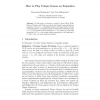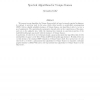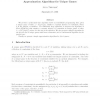147
click to vote
CORR
2011
Springer
14 years 5 months ago
2011
Springer
We present an approximation scheme for optimizing certain Quadratic Integer Programming problems with positive semidefinite objective functions and global linear constraints. Thi...
118
click to vote
CORR
2011
Springer
14 years 9 months ago
2011
Springer
In this paper, we study the average case complexity of the Unique Games problem. We propose a natural semi-random model, in which a unique game instance is generated in several st...
199
click to vote
WAOA
2010
Springer
14 years 12 months ago
2010
Springer
In this paper, we improve a result by Arora, Khot, Kolla, Steurer, Tulsiani, and Vishnoi on solving the Unique Games problem on expanders. Given a (1-)-satisfiable instance of Uniq...
120
click to vote
FOCS
2010
IEEE
15 years 1 days ago
2010
IEEE
We give subexponential time approximation algorithms for UNIQUE GAMES and the SMALL-SET EXPANSION. Specifically, for some absolute constant c, we give:
121
click to vote
APPROX
2010
Springer
15 years 3 months ago
2010
Springer
In this paper, we investigate whether a constant round Lasserre Semi-definite Programming (SDP) relaxation might give a good approximation to the UNIQUE GAMES problem. We show tha...
119
click to vote
COCO
2010
Springer
15 years 6 months ago
2010
Springer
We present a new algorithm for Unique Games which is based on purely spectral techniques, in contrast to previous work in the area, which relies heavily on semidefinite programmi...
112
click to vote
FOCS
2005
IEEE
15 years 7 months ago
2005
IEEE
We present a polynomial time algorithm based on semidefinite programming that, given a unique game of value 1 − O(1/ log n), satisfies a constant fraction of constraints, wher...
130
click to vote
COCO
2007
Springer
15 years 8 months ago
2007
Springer
Motivated by the study of Parallel Repetition and also by the Unique Games Conjecture, we investigate the value of the “Odd Cycle Games” under parallel repetition. Using tools...
128
click to vote
STOC
2006
ACM
16 years 2 months ago
2006
ACM
Unique games are constraint satisfaction problems that can be viewed as a generalization of Max-Cut to a larger domain size. The Unique Games Conjecture states that it is hard to ...
112
click to vote
STOC
2007
ACM
16 years 2 months ago
2007
ACM
We show that, assuming the Unique Games Conjecture, it is NPhard to approximate MAX 2-SAT within LLZ + , where 0.9401 < LLZ < 0.9402 is the believed approximation ratio of t...




